-
You Got OlderA Play
MAE: I used to have a fantasy where my high school boyfriend Dave Gellatly – who totally cheated on me and like destroyed all of my self-confidence – would come to my window and knock on my window and then I would let him in and then he would be high on cocaine (even though I’m pretty sure he never did cocaine) and he would like rape me? And the whole time I’m thinking: Maybe I should scream! If I scream, my parents will wake up and come down here and save me and this whole thing will stop. But then if my parents come down here, they’ll see me naked with Dave on top of me. And I’m like a virgin. And super Christian. So I don’t scream. Because I’m too embarrassed. And he rapes me. And then later I decide to report it. And the whole town vilifies me and I’m like this outcast woman? And then Dave dies in a drunk driving accident and everyone is like: If you had just not reported it he would have died anyway and you would’ve gotten justice without having to besmirch his name
MAC: That was a fantasy?
MAE: I guess I just used to think about it when I needed to cry
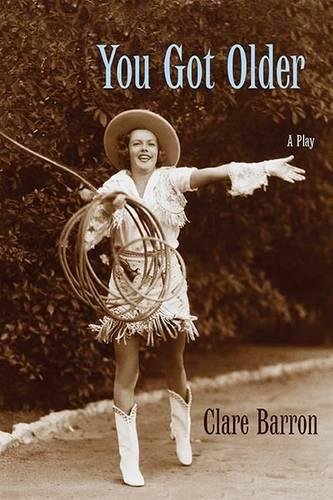 You Got OlderPremiered in2014
You Got OlderPremiered in2014 -
You Got OlderA Play
HANNAH: It's weird when someone you hate dies of cancer. I'm pretty sure I wished that he'd die of cancer. Like verbally wished that he'd die of cancer. More than once. Maybe several times. I'm pretty sure that I said he was fundamentally a force for evil. I'm pretty sure I said that if he died the world would get a net gain in goodness and purity and kindness and love. But yeah. I didn't mean it. I don't think I meant it. Maybe I meant it? I guess I did mean it. At the time. In any case. I'm sorry he died. I didn't want him to actually die. But anyway…
MATTHEW: The sweater didn’t kill him.
HANNAH: No. Maybe?
(Hannah pulls her baseball cap down.)
MATTHEW: It didn’t.
HANNAH: But it's not just me.
It’s everyone.
There is a curse.
You knit someone a sweater and they break up with you.
 You Got OlderPremiered in2014
You Got OlderPremiered in2014 -
You Got OlderA Play
DAD: The thing that always gets me is this. You’re outside. You’re looking at the sky. And it’s a beautiful sky. You’re happy to be alive. You’re aware that you’re having a nice moment. That it’s a good moment in your life. But then how long should you let it go on, you know? Shouldn’t you just look at the sky forever? Or at very least until you get very hungry and you have to go do something else? But I’m always itching to go do something else even when I’m in the middle of having a nice moment. It makes me feel guilty.
(They sit.)
(Mae thinks about Damian who she fucked without a condom even though she didn’t really want to fuck him without a condom and how she put her legs over his shoulders. Or his legs over her…? No. His shoulders. Her legs over his shoulders.)
MAE: Should we go in?
 You Got OlderPremiered in2014
You Got OlderPremiered in2014
-
In a Father's PlaceStoriesFrom"On the Rivershore"
The boy’s name is Cecil Mayberry; he is twelve, white, and he knows something. He knows what his mother is going to make for supper, pot roast and green Jell-O salad; he knows that the Russians have put a Sputnik in the sky. But these are not the items that are just now on Cecil’s mind. He is thinking about a man, a waterman, lying face down in a tidal pool two hundred yards from where he sits. Cecil knows the man’s name, Grayson “Tommie” Todman, and he knows that two .22-caliber bullets have made a mess of Tommie’s head. He knows the first one entered just below the right cheekline, cutting short Tommie’s last Fuck You to the world, and the second one grazed through his hair before nipping in at the peak and blowing out a portion of Tommie’s unlamented brain.
In fact, this is going to be the first time in Cecil’s life—but not the last—that he is an undisputed expert on a certain subject. He knows who shot Tommie, and why.
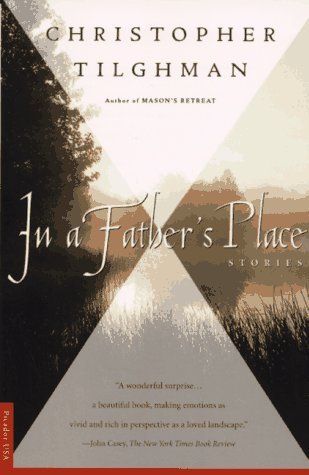 In a Father's Place : Stories
In a Father's Place : Stories -
In a Father's PlaceStoriesFrom"Norfolk, 1969"
And now, when he looks back on the sixties, this is where Charlie Martin remembers himself, standing on that discarded spot, held by something in him from birth, or something remaining from that joyful crossing home six months earlier. When he came back from the next cruise Julie was not on the pier; she had left Norfolk, and him, by then. When his three years were up, he thought fleetingly, but hard, about staying in for three more, but there was never any chance that he would make a career in the Navy, just as there was never any chance that he would throw rocks and balloons full of pig blood at the Justice Department walls. The time for such choices was soon past, and the middle of the road widened enough for Charlie to leave behind the painful discoveries of youth and first love. What remained of Julie, and Norfolk, and the sixties was the sea, boundless and inexhaustible, the mystery and the source.
 In a Father's Place : Stories
In a Father's Place : Stories -
In a Father's PlaceStoriesFrom"Hole in the Day"
Six hours ago Lonnie took one last look at Grant, at the oily flowered curtains and the kerosene heater, the tangled bed and the chipped white stove, at the very light of the place that was dim no matter how bright and was unlike any light she’d ever known before, and she ran. She ran from that single weathered dot on the plains because the babies that kept coming out of her were not going to stop, a new one was just beginning and she could already feel the suckling at her breast. Soon she will cross into Montana, or Minnesota, or Nebraska; she’s just driving and it doesn’t really matter to her where, because she is never coming back.
 In a Father's Place : Stories
In a Father's Place : Stories
Selected Works
read more >-
Apricots from ChernobylEssaysFrom"Crossing the Border"
The police ask me to empty my pockets. I turn them inside out and lay my miserabilia on the table. Two policemen quite unashamedly feel my thighs and ass, which tickles me. With clinical concentration they examine the stuff on the table. It is an obscene invasion of my privacy, more so than if they had turned my asshole inside out and inspected it under a microscope—any microbiologist could tell you that there we are remarkably similar. In pockets turned inside out you can see how we differ.
 Apricots from Chernobyl : Essays
Apricots from Chernobyl : Essays -
Apricots from ChernobylEssaysFrom"Writing in Tongues"
… when you don’t get the shade of a word because you haven’t grown up listening to American lullabies, your friends smile patronizingly; when you don’t get accents because you haven’t grown up with them while your ear was flexible, your friends treat you as a comic alien, an aquamarine creature—you grope with your fins in the sand (and the sand seems to be English, while the water would be your native tongue). Tell me about the advantage then! My writer friends put me in my place, show me how superficial my project of writing in English must be. Where in me are those soulful contacts with words that can be made only with mother’s nipple between your naked gums?
 Apricots from Chernobyl : Essays
Apricots from Chernobyl : Essays -
Apricots from ChernobylEssaysFrom"On Becoming Naturalized"
A car with a Black man and woman in it stopped. The man rolled down the window, and asked me: “Is everything all right?”
“I was just attacked by three guys, they knocked me over the head…”
“You seem to be all right,” he said.
“I don’t know. Could you give me a ride?” His concern made me feel that I could trust him though by now it was clear that I could not trust my feelings.
“Not really. I need to take my girlfriend home. Good luck!”
 Apricots from Chernobyl : Essays
Apricots from Chernobyl : Essays
Selected Works
read more >-
Drinking Coffee ElsewhereStoriesFrom"Brownies"
By our second day at Camp Crescendo, the girls in my Brownie troop had decided to kick the asses of each and every girl in Brownie Troop 909. Troop 909 was doomed from the first day of camp; they were white girls, their complexions a blend of ice cream: strawberry, vanilla. They turtled out from their bus in pairs, their rolled-up sleeping bags chromatized with Disney characters: Sleeping Beauty, Snow White, Mickey Mouse; or the generic ones cheap parents bought: washed-out rainbows, unicorns, curly-eyelashed frogs. Some clutched Igloo coolers and still others held on to stuffed toys like pacifiers, looking all around them like tourists determined to be dazzled.
 Drinking Coffee Elsewhere : Stories
Drinking Coffee Elsewhere : Stories -
Drinking Coffee ElsewhereStoriesFrom"Our Lady of Peace"
At the end of the first week of teaching, Lynnea found herself having to raise her voice to get their attention—something she wasn’t used to doing. They didn’t quite yell and scream, but their collective whimsical talk was the unsettling buzz of a far-off carnival. When she sent them to the principal’s office, they snickered and bugged out cartoon eyes, heading toward the office for a few paces, then bolting in the opposite direction. She found herself sharking the room, telling duos here and there that they should not be talking about their neon fingernail polish or the Mos Def lyrics in front of them, but the novel at hand, Their Eyes Were Watching God. They were quiet for a moment, controlling their grins as if they were hiding something live and wriggling between the covers of their notebooks.
 Drinking Coffee Elsewhere : Stories
Drinking Coffee Elsewhere : Stories -
Drinking Coffee ElsewhereStoriesFrom"Speaking in Tongues"
You could only truly speak in tongues when all worldly matters were emptied from your mind, or else there was no room for God. To do that, you had to be thinking about him, praising him, or singing to him. She had tried at church and she had tried at home, but nothing worked. In her room, she would genuflect, pushing her head against her bed ruffle, reciting scriptures, praying, singing, concluding it all with a deep, waiting silence. But nothing would come out. Her only solace was that Marcelle was three years older and hadn’t spoken in tongues either.
 Drinking Coffee Elsewhere : Stories
Drinking Coffee Elsewhere : Stories
Selected Works
read more >-
Polaroid StoriesAn Adaptation of Ovid's Metamorphoses
NARCISSUS: it’s like it’s like
ECHO: it’s like it’s like
NARCISSUS: it’s like this, check it out: i meet this guy, right, and we go to his place and it’s phat it’s plush
ECHO: it’s phat it’s plush
NARCISSUS: it’s all glass and chrome
ECHO: glass and chrome
NARCISSUS: black leather, plush pile, big-screen tv with surround sound
ECHO: surround sound
NARCISSUS: mirrors everywhere, on the walls, in the hall, on the ceiling, looking at myself
ECHO: looking at myself
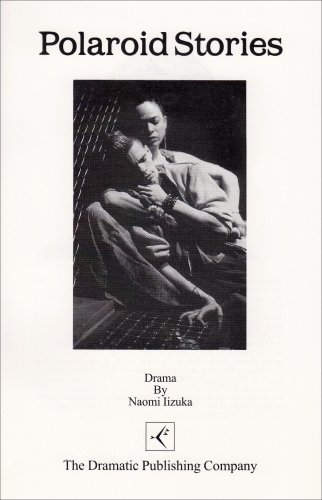 Polaroid Stories (iizpolar)Premiered in1997
Polaroid Stories (iizpolar)Premiered in1997 -
Polaroid StoriesAn Adaptation of Ovid's Metamorphoses
ORPHEUS: when you sleep, i read your mind. it’s like we’re lying real close, skull to skull, and our brains meld, they become all siamese twin like, and i’m like sucking the thoughts right out of your head, swirling them around, seeing how they taste
EURYDICE: yeah, and how do they taste?
ORPHEUS: good
EURYDICE: yeah?
ORPHEUS: juicy
 Polaroid Stories (iizpolar)Premiered in1997
Polaroid Stories (iizpolar)Premiered in1997 -
Polaroid StoriesAn Adaptation of Ovid's Metamorphoses
NARCISSUS: when i was a little kid, the building where i lived at, it caught on fire, mmhm, and my mother, she held me out of the window, and she was all like: “fly away fly away fly away, little bird,” and then she let go – only thing was, i wasn’t no little bird, and i didn’t fly, i fell, and i don’t know what the bitch was smokin, cause if i didn’t die from the fire, i shoulda straight up died from the fall – ‘cept the thing being i landed on this big old mattress somebody threw out with the trash - fuckin fate, man, was on my ass – and then later this old wino found me, and took care of me for a while till his liver gave out, and then i was on my own, i was all alone, and that is the truth, i swear to god –
 Polaroid Stories (iizpolar)Premiered in1997
Polaroid Stories (iizpolar)Premiered in1997
Selected Works
read more >-
The Undiscovered CountryA Novel
Then, without any warning, Taylor could speak Abini. June and Peter could not recall a learning period, a month when the girl communicated awkwardly with the villagers. By the time June noticed her daughter speaking the native language, the girl was spitting out long sentences at her friends, laughing with them, and joining in songs and chants, and when June’s back was turned to Taylor and her friends, she could barely distinguish her daughter’s voice from those of the other children.
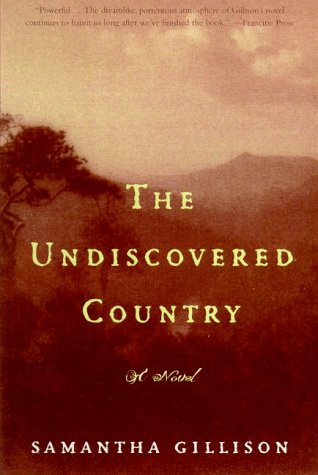 The Undiscovered Country : A Novel
The Undiscovered Country : A Novel -
The Undiscovered CountryA Novel
When he woke up, he did not know where he was, and the red, grease-covered boys and the men chanting in Abini began to blend into a dark pattern where he could no longer make out individuals. The men started to play bamboo flutes, and the sound disappointed Peter. The flutes sounded distant and reedy, and the music had no melody, only an insistent percussive drive. He looked around the room and tried to find Makino or any of the other men he had come from Abini with, but he could not distinguish any of the people around him.
It was only when he saw [his daughter] Taylor, sitting near the door with poinsettia leaves crowning her head, that he realized he was hallucinating. Ah, he thought, I am really very sick now. And then he was aware of fainting into Makino’s arms.
 The Undiscovered Country : A Novel
The Undiscovered Country : A Novel -
The Undiscovered CountryA Novel
She called Taylor inside and asked her to pronounce the words. Taylor stared at her mother, silent, with large eyes that seemed full of fear. For a moment June thought that she would say something, or refuse to be with her, but she stayed there, quiet, unhappy, and finally began to speak Abini so quickly the words sounded like hiccups in her mouth. June mimicked her daughter and heard how awkwardly her own voice wrapped around the language—she knew she sounded wrong and comical.
“I can’t get it right,” she said.
“Try, Mom. Try harder,” Taylor said.
 The Undiscovered Country : A Novel
The Undiscovered Country : A Novel
Selected Works
read more >-
The Train to Lo WuStoriesFrom"For You"
Rising at four, the students bow to the Buddha one hundred and eight times, and sit meditation for an hour before breakfast, heads rolling into sleep and jerking awake. At the end of the working period the sun rises, a clear, distant light over Su Dok Mountain; they put aside brooms and wheelbarrows and return to the meditation hall. When it sets, at four in the afternoon, it seems only a few hours have passed. An apprentice monk climbs the drum tower and beats a steady rhythm as he falls into shadow.
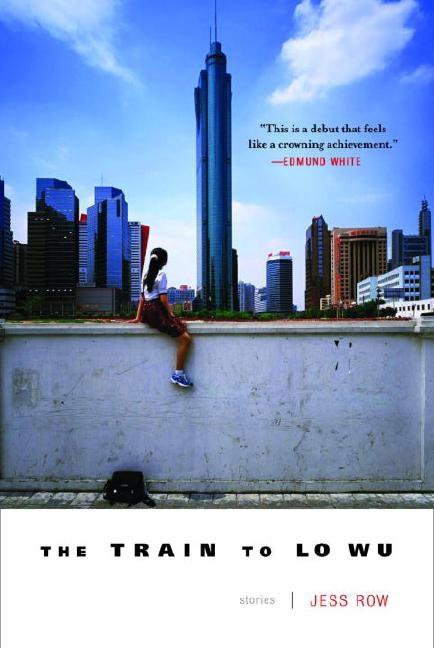 The Train to Lo Wu : Stories
The Train to Lo Wu : Stories -
The Train to Lo WuStoriesFrom"The Train to Lo Wu"
I want to have a kindergarten. She bit down on her lower lip, scraping it with her teeth. Not work in one. I’ve done that. I want to have a private kindergarten, like they do in Shanghai and Beijing, where the parents pay. That way you can have enough blankets and cots and chair for every student. You can do painting and music and teach English. And you can get your own cook and have decent food. Only a certain number of students admitted each year.
 The Train to Lo Wu : Stories
The Train to Lo Wu : Stories -
The Train to Lo WuStoriesFrom"The Ferry"
Hong Kong is like no place he has ever imagined. Green hillsides rising out of a steel-colored sea. Rows of identical white apartment blocks that seem to sprout from low-hanging clouds, like mushrooms after rain. When he steps outside the airport terminal the air sticks to his skin, and he feels queasy, his joints rubbery, a bad taste in his mouth. He’d give anything for a shower.
 The Train to Lo Wu : Stories
The Train to Lo Wu : Stories
Selected Works
read more >-
The Ruby SunriseA Play
LULU: Mr. Marcus, I didn’t even want to waste your time. Pride and Prejudice is not a book that makes for a teleplay.
MARTIN: Philco’s killing us with the class acts.
LULU: There’s more to classy material than rich people in mansions talking in high-class accents. There are stories to tell about the little guy, an American guy, and the contributions they make; or even fail to make. You see a bum on the street, or a woman yelling at her kids after working in a factory all day, but to really understand what causes that behavior… Each of these people had goals; they had dreams; they had disappointments. TV can get inside that, can get close, and be honest about it. That’s what’s classy.
MARTIN: So no more period pieces?
LULU: If they’re topical.
MARTIN: Pride and prejudice: sounds topical.
LULU: It’s about marriage. Today’s audience has more on their mind than who marries who.
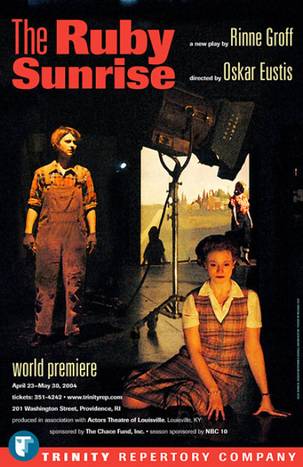 The Ruby Sunrise (grorubys)Premiered in2004
The Ruby Sunrise (grorubys)Premiered in2004- Print Books
- Powell's
- Barnes & Noble
- Alibris
- Abe Books
- Dramatists Play Service
-
The Ruby SunriseA Play
TAD: You say that like you know what it means. We don’t even know what it means yet.
LULU: I do know what it means. “Tele” is Greek for far and “vision” is Latin for seeing, and it’s the perfect name, because it’s democratic.
TAD: Democratic?
LULU: Yes, both languages get a vote. And what TV does is democratic: a machine that treats everyone equal, so a girl in Indiana is as important as a fat cat in New Jersey. TV is free. It moves through the air that we breathe. You don’t have to buy a ticket. You don’t need a car. We’re all together even if we’re a thousand miles apart. We all belong. Finally. Don’t look at me like I’m crazy.
TAD: That’s not how I’m looking at you.
LULU: How then?
TAD: Like you’re beautiful.
 The Ruby Sunrise (grorubys)Premiered in2004
The Ruby Sunrise (grorubys)Premiered in2004- Print Books
- Powell's
- Barnes & Noble
- Alibris
- Abe Books
- Dramatists Play Service
-
The Ruby SunriseA Play
LULU: Don’t let them do this.
MARTIN: Do what?
LULU: Turn you into a coward.
TAD: It’s not cowardice.
PAUL: It’s patriotism.
LULU: It’s not illegal to go to a political conference. It’s not illegal to be a communist for crying out loud.
SUZIE: Oh, I think it is.
LULU: This is America.
SUZIE: But not for communists.
PAUL: Don’t kid yourself, miss, these people want to infiltrate our way of life.
LULU: Can you even define “infiltrate?”
PAUL: All I know is they’re trying to infiltrate the Actors Studio.
 The Ruby Sunrise (grorubys)Premiered in2004
The Ruby Sunrise (grorubys)Premiered in2004- Print Books
- Powell's
- Barnes & Noble
- Alibris
- Abe Books
- Dramatists Play Service
Selected Works
read more >-
Notes from the Divided CountryPoemsFrom"Middle Kingdom"
Gruel, crumbs on a table
of ice, a labyrinth of snow:
and infinite distances
in the small box of the kitchen.
Mother chopped pieces
of her heart into the skillet.
Brother and I heard oil sizzle
until we huddled in shame.
She salted the meat with tears.
She cried if we ate
and cried if we refused to eat,
warning You’ll go hungry.
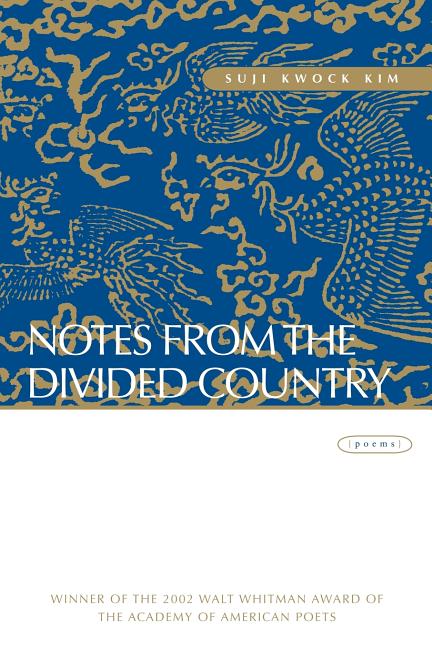 Notes from the Divided Country : Poems
Notes from the Divided Country : Poems -
Notes from the Divided CountryPoemsFrom"Animal Farm, or Song of the Colonial Governor-General"
Admit it. You hate the body
because it can be broken,
stabbed, shot full of holes.
And so you become a butcher.
Say the spirit cannot be broken.
Say you see better than anyone
how fiercely an ox, a hog, a cock
fights to stay alive, until the end.
You wonder how nothing seems
to stop this rat: sucking, gnawing
through cement walls to snatch
scraps of gristle – not knowing
what you need to kill, or why.
Beat it with a shovel: skin-slither,
pestle of skull and will. Admit
it shamed you to cover with dung.
 Notes from the Divided Country : Poems
Notes from the Divided Country : Poems -
Notes from the Divided CountryPoemsFrom"Monologue for an Onion"
I don’t mean to make you cry.
I mean nothing, but this has not kept you
From peeling away my body, layer by layer,
The tears clouding your eyes as the table fills
With husks, cut flesh, all the debris of the pursuit.
Poor deluded human: you seek my heart.
Hunt all you want. Beneath each layer of mine
Lies another skin: I am pure onion – pure onion
Of outside and in, surface and secret core.
 Notes from the Divided Country : Poems
Notes from the Divided Country : Poems
Selected Works
read more >-
Playing in TimeEssays, Profiles, and Other True StoriesFrom"The Prospect"
Like most of the fight world’s habits, hand wrapping is both practical and ritual. Done properly, it protects the hands from damage without giving a fighter an unfair advantage. Like boxing gloves or a football helmet, wrapping functions as both armor and sword, a protective measure that allows you to hit harder and more frequently than you could without it. One of the officials murmured, “That’s beautiful.” Colonna said “Thank you” without looking up from his work.
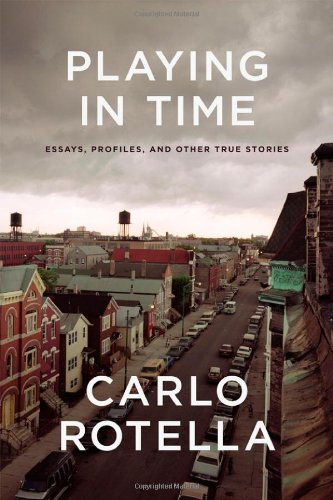 Playing in Time : Essays, Profiles, and Other True Stories
Playing in Time : Essays, Profiles, and Other True Stories -
Playing in TimeEssays, Profiles, and Other True StoriesFrom"Someone Else’s Chicago"
The Polkaholics, sweating like stevedores, are in fine ironic form, decked out in white shoes, black pants, white ruffled shirts, and stunning leopard-print vests with matching oversize bow ties. All wear thick-framed glasses, and anyone standing anywhere near the stage can smell the torrent of Old Spice with which they douse themselves, Method actor style, before a show. They do not play polka versions of rock tunes, an ill-advised crossover strategy that has produced far too many bizarre novelty songs by polka bands. Rather, they play original songs and well-chosen polka covers that make use of rock sensibilities, winkingly sampled classic-rock phrases, and bursts of the jet-engine guitar whine common to certain forms of punk and heavy metal—all undergirded by drums and bass playing straight-ahead, hurry-up polka rhythms.
 Playing in Time : Essays, Profiles, and Other True Stories
Playing in Time : Essays, Profiles, and Other True Stories -
Playing in TimeEssays, Profiles, and Other True StoriesFrom"Un Clown Biologique"
Tom C. cultivated a morbid fascination with clowns. Instead of merely doodling in class, he created obsessive dossiers of clown types: the savage Jester, the crocodile-teared Sad Clown, the enigmatic Bowler Hat, the rare Plume Clown, the annihilating Whiteface. He practiced different stylized ways of saying the word clown—drawing it out, barking it sharply, stretching his rubbery features to make a demented face while he said it, adopting a strangled or a booming voice—as if he could figure out what was hiding in the word by turning it inside out. He drew up clown scenarios and composed clown ditties, and invented ancient traditions to which they belonged. He tried to figure out if it would be worse to wake up one night to find a clown at the foot of your bed or to think you had dreamed it and then find a deflated balloon in your room the next morning.
 Playing in Time : Essays, Profiles, and Other True Stories
Playing in Time : Essays, Profiles, and Other True Stories